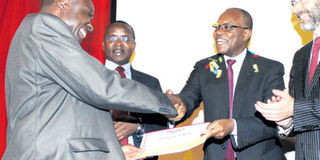Richest literary prize in the region goes to Kiswahili teacher

(From left) The Tuzo ya Fasihi ya Ubunifu winner Amos Nandasaba Kundu, Spotlight Publishers managing director Simon Sossion, the Nation Media Group Editor-in-Chief Tom Mshindi and the French Ambassa Remi Marechaux during the prize presentation at the French Cultural Centre in Nairobi on December 16, 2015. PHOTO| ANTHONY OMUYA
What you need to know:
Simon Sossion, the managing director of Spotlight Publishers, pointed out that the intention of the prize is to encourage young writers to compete with established names, especially considering that prospective writers have tended to accuse publishers of only considering the works of established writers.
He emphasized that this prize will pay more attention to the creativity of submitted manuscripts rather than the name of the author. Spotlight, Sossion said, would publish the top three ranked manuscripts in 2016.
Also, the other shortlisted manuscripts will be considered for publication by Spotlight publishers if deemed good enough.
Kiswahili literature recently harvested a Sh1 million prize. The Tuzo ya Fasihi ya Ubunifu (Prize for Creative Kiswahili Literature) was awarded at the Alliance Francaise, in Nairobi on December 16, 2015.
The prize is due to collaboration between the French Embassy, Spotlight Publishers and the Nation Media Group, through its online publication, Swahilihub.
Over 150 entries were submitted to the committee. At the award ceremony were the 15 shortlisted writers, 14 men and 1 woman.
Among the writers whose manuscripts were in the first 15 included Nyamohanga Eradema Joel, Daniel Oduor Okello, Alex Ngure, Mwenda Mbatiah, Amos Nandasaba Kundu, Silvester Ochieng’ Oduya, John Kibara, Mathew Theuri Maina, Maria Mjomba
Ambi Wughanga, Joseph Chahiru Enzori, Kelvin Nyaga, Onesmus Onyango, Mureith Moses Murenga, Ndege Abdul Mwangala, James Suiyanga.
The three top shortlisted manuscripts were Shamba la Halaiki, a play by Daniel Oduor Okello; Dau la Mnyonge, a novella by Silvester Ochieng’ Oduya.
The winner of this inaugural Ubunifu Prize for Kiswahili Literature 2015 was Nyota Njema Mawinguni, a novel, by Amos Nandasaba Kundu.
Mr Kundu is a teacher of Kiswahili and history. The winning novel will also be translated into French and published in France. Nation Media Group undertook to promote the three wining books when published.
Speaking at the ceremony, the French Ambassador to Kenya, Remi Marechaux, said the French Embassy was interested in supporting efforts that promote culture. He emphasised that Kiswahili is not only an ancient language; it is also a language of
communication, trade and cultural production not only in the East African countries but other parts of the world. This, he reiterated, is why Kiswahili is now taught in several institutions of learning in the world.
Mr Marechaux expressed hope that this latest award will promote literature that bridges the gap that exists between the so-called Kiswahili sanifu (highbrow Swahili fiction) and popular literature in Kiswahili, which should allow ordinary citizens to read
literature in Kiswahili, even in matatus.
He highlighted the role played by the Alliance Francaise, which in 2015 was involved in 217 cultural events that involved activities promoting Kenyan and French cultures.
On his part, Tom Mshindi, the Nation Media Group’s Editor-in-Chief, noted that the group will support the prize as an annual event to support prospective and young writers. Nation Media Group, Mshindi said, noted the significance of Kiswahili as a national language, a language of bringing Kenyans together but the importance of Kiswahili in promoting a reading culture.
Mshindi noted that Nation Media Group is working with institutions, including universities in the rest of the world, to promote research in and use of Kiswahili. This, he said, is why Nation hosts Swahilihub, which not only hosts newspapers but is active in provoking debate on emergent issues in Kiswahili in the country and the region.
Simon Sossion, the managing director of Spotlight Publishers, pointed out that the intention of the prize is to encourage young writers to compete with established names, especially considering that prospective writers have tended to accuse publishers of only
considering the works of established writers. He emphasized that this prize will pay more attention to the creativity of submitted manuscripts rather than the name of the author. Spotlight, Sossion said, would publish the top three ranked manuscripts in 2016.
Also, the other shortlisted manuscripts will be considered for publication by Spotlight publishers if deemed good enough.
The judging panel was headed by Kimani Njogu, a renowned literary and Kiswahili scholar. Also in the panel were Prof Sheila Rianga, Dr Richard Wafula, Prof Natalie Caree, Dr Ken Walibora and Hezekiel Gikambi who was also the secretary of the jury.
PRIMARY EXPECTATIONS
The committee read 148 entries which met the primary expectations. The committee then reduced the entries to 82, then 15 and lastly three. The committee noted that there are good creative writers, as reflected in the competence of the entries which looked at gender issues, leadership, history, corruption, discrimination, and education. Njogu noted that several writers boldly dealt with subjects that tend to be seen as taboo in Kenya.
The creativity of the writers was reflected in competent use of language, innovation, effective handling of subject matter, and writing in relation to other writers – intertextuality. Among the weakness was writing that tended towards journalese, writing that tended towards traditionalism, forcing sayings, over-censorship, and poor or forced ending. The biggest challenge was writing that tended towards propaganda or preaching religious orthodoxies. Again, there were few women writers, with the committee recommending more entries from women.
Njogu noted that the winning writers reflected not just adherence to the rules of entry but sophisticated writing that provoke readers to ponder the human condition today. This prize clearly demonstrates that Kiswahili, a language that is now spoken by over 140 million people, is not just a tool for communication but a cultural heritage that Kenyans needs to celebrate every day, by speaking it.
Dr Tom Odhiambo, PhD, teaches literature at the University of Nairobi





